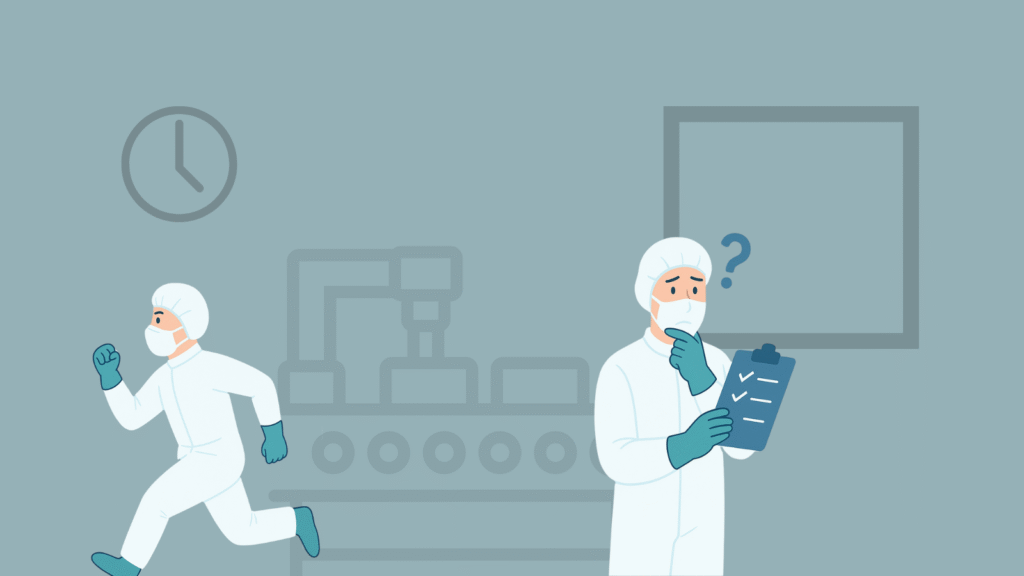In the pharmaceutical industry, every day is a challenge if the systems are operating weakly. Despite having stringent procedures and sophisticated equipment in place, human errors continue to contribute significantly to deviations and non-conformances.
Many of these errors are avoidable if individuals remain alert, strictly follow procedures, and adopt a culture of quality. Let’s explore ten common reasons behind human errors in and understand why they happen in the first place.

Why Do Human Errors Happen?
Human errors often arise not because people want to do things incorrectly, but because of various factors that affect attention, understanding, and performance. Let’s explore the most common reasons behind these errors.
1. Distraction at Work
An operator may be physically present at work but mentally preoccupied. Personal issues at home, worrying about a sick family member, financial stress, mobile phone interruptions, or even a recent serious conversation with a manager can lead to lapses in focus. When the mind drifts away from the task at hand, errors become more likely.
2. Pressure of Time
When activities are performed under time pressure, especially towards the end of a shift or close to handover, operators may rush through critical steps. The urgency to complete a task before leaving can lead to missed checks, skipped steps, or superficial documentation. This sense of “beating the clock” is a major contributor to errors.
3. Attitude and Behavior
Sometimes the problem lies in the operator’s attitude or level of discipline. If an individual does not take procedures seriously or deliberately takes shortcuts, no amount of training can compensate. A casual or careless approach can lead to errors, especially in environments where vigilance is essential at every stage.
4. Improper or Incomplete Training
Human errors also arise from inadequate training. An operator might claim to have understood the procedure simply to avoid embarrassment or additional questioning, even if they are unsure. Alternatively, they may form a wrong interpretation of the procedure due to poor explanation or unclear instructions. It is the trainer’s responsibility to confirm understanding through practical demonstration or questioning, ensuring the operator is confident and capable of performing the task as intended.
5. Lack of Team Coordination
Many pharmaceutical activities require teamwork, such as line clearance, aseptic connections, or reconciliation tasks. When team members fail to communicate effectively or don’t understand their specific roles, errors can easily creep in. Actions that are not aligned with other team members or misassumptions during collaborative tasks often lead to deviations.
6. Miscommunication Between Shifts
Shift handovers are critical moments. This is where the employee of the previous shift should clearly communicate and hand over the task to be continued by the next operator. If the outgoing shift fails to clearly communicate the status of a process, or the incoming team does not ask clarifying questions, misunderstandings can result. When operators are unsure but proceed without seeking clarification, errors are likely to occur. Ensuring thorough, documented, and repeat-back communication during handover can reduce this risk.
7. Monotony and Fatigue
Performing repetitive tasks every day can lead to attention fatigue over time. When operators perform the same activity for hours or days, the risk of errors increases. Tiredness reduces focus, reaction time, and decision-making ability, all of which can result in errors.
8. Inadequate Supervision and Oversight
Even experienced operators need occasional checks and guidance. When supervisors fail to monitor critical operations closely, small mistakes can go unnoticed until they cause larger problems. Active supervision reinforces accountability and provides a safety net against individual oversights.
9. Complex or Unclear Procedures
Sometimes the root cause is not the operator, but the procedure itself. Overly complicated, ambiguous, or poorly written standard operating procedures (SOPs) increase the chance of misunderstanding. If steps are not logically sequenced or explained clearly, even diligent operators can make mistakes while trying to interpret them.
10. Environmental and Workplace Factors
Lastly, the physical working environment can play a role. Excessive noise, poor lighting, uncomfortable temperature, or frequent interruptions from other operations can all interfere with focus. A well-designed and controlled workspace supports better focus and fewer errors.

Conclusion
Human errors in the pharmaceutical industry are expected, but they are also preventable with the right mindset and approach. By understanding the root causes, whether it’s distraction, time pressure, poor communication, or lack of proper training, we can implement targeted strategies to minimize these mistakes. Building a culture of attentiveness, discipline, and teamwork, along with regular, meaningful training and effective communication, will go a long way in reducing deviations caused by human error.



